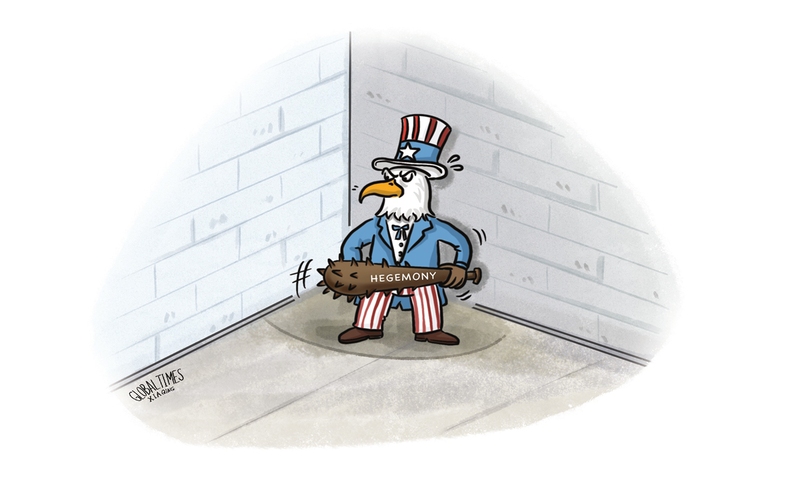
The Bully. Illustration: Xia Qing/GT
With the world increasingly awakening from the spell of US hegemony, the US is isolating itself more and more in the international community. Such a trend has apparently worried some US political elites.
In an interview with Bloomberg on Saturday local time, former US Treasury secretary Lawrence Summers said there are troubling signs that the US is getting lonely as other powers align together.
Summers made the remarks during his attendance at the 2023 Spring Meetings of the World Bank Group and the International Monetary Fund, where the key theme has been a warning about the fragmentation of the world economy, according to Bloomberg. The former US official acknowledged the growing acceptance of such a tendency, warning about a growing sense that ours [the US'] may not be the best fragment to be associated with.
The fragmentation of the world economy is mainly the result of Washington's hegemonic policy. The US has taken unilateral measures, including sanctions and decoupling, to deal with many other countries, including China. In this process, other countries can see more clearly that Washington is exploiting its advantage as a hegemon to pursue protectionism and self-interests, therefore they will accelerate the establishment of cooperation on the bilateral and regional levels to protect themselves and strengthen their economic security.
While the world's multipolarity is gradually taking shape and being accepted by most countries, the US is still indulging in hegemony and refuses to accept a world with multiple poles. The US is using its dominance of the international economic and political system to suppress its competitors, and doesn't even spare its own allies.
The Joe Biden administration claims that his country is returning to the alliance system. Still, from the Inflation Reduction Act that causes opposition from some European countries to the sales of liquefied natural gas to European allies with a higher price amid the Russia-Ukraine conflict, Washington is undermining the interests of its allies and partners to achieve its own economic development.
As the world carries on with the journey of pursuing peace and development, the US, bucking the trend, is destined to lose its appeal and global influence, just as Summers feared. Most of the reconciliation in the Middle East is taking place without US involvement; most countries refuse to play along with the US' handling of the Ukraine crisis; European leaders, such as French President Emmanuel Macron, are emphasizing European strategic autonomy more; Brazilian President Luiz Inacio Lula da Silva has called for de-dollarization in Beijing - these are all manifestations of US' growing isolation.
In the interview with Bloomberg, Summers quoted someone from a developing country as saying, What we get from China is an airport. What we get from the US is a lecture. In the face of airports and lectures, most countries, especially the developing ones, clearly know which contribute more to their development. These countries have also made their own choices, making the US look increasingly alienated today.
Meanwhile, the legitimacy of the world order the US dominates will become increasingly weakened, creating greater constraints on Washington's exercise of hegemony. As a result, US hegemony will end up being weakened, starting with the economic sphere.
But even with its power constrained, the US still does not want to restrain itself, but instead exerts more of its remaining hegemony. By pushing the alliance system, the Biden administration aims to turn Washington's sole hegemony into a so-called collective hegemony of the US and its allies.
What's more, even if some political elites in the US can point out their country's problems, it is difficult for them to propose effective solutions due to habitual hegemonic thinking.
For example, Summers claimed that the US is on the right side of history regarding its commitment to democracy and resistance to aggression in Russia. Such statements reveal the usual arrogance and self-righteousness of US elites. If what Summers said is true, why is there a growing disagreement in most countries with US-style democracy and Washington's position on Russia-Ukraine conflict?
It is apparent that the US won't give up its hegemonic mind-set sooner or later. Therefore, its further alienation from the rest of the world is inevitable. But Washington is likely to face great obstacles in continuing to walk on its hegemonic path because of the trend of globalization and multipolarity, as well as the emergence of internal conflicts in the West.
The US needs to understand that it is not the lone fighter for justice it imagines itself to be. Instead, its isolation is precisely a product of its own unjust actions. A Chinese saying argues that an unjust cause finds little support. This will become the destiny of the lone hegemon.
The article is compiled by Global Times reporter Xia Wenxin based on an interview with Song Guoyou, deputy director of the Center for American Studies, Fudan University.

